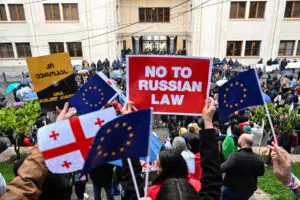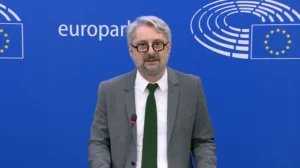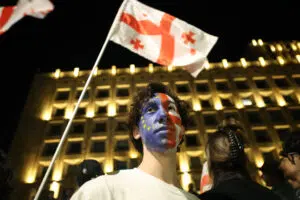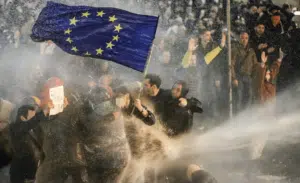Brussels – From a pro-Russian parliament to one trying to provide all the support it can to citizens and young pro-Europeans who aspire to join the Union. “We have not asked Georgia to join, but if it wants to do so, this is the path to follow to move forward with integration,” Lithuanian MEP Petras Auštrevičius (Renew Europe) said without mincing words, hosting in the Strasbourg Chamber yesterday (April 23) Nika Gvaramia, leader of the new Ahali party (which means ‘New’) and one of the most anticipated opposition political figures in the October 26 elections. “We have received a letter from the oppositions in Parliament asking for measures to be taken against those who bring forward legislation on the Russian model. There will be a response with a resolution,” the member of the Foreign Affairs Committee (AFET) of the European Parliament confirmed.

The pressing issue is the controversial draft law on ‘transparency of foreign influence,’ which the ruling Georgian Dream Party wanted as early as last year, and stalled until after the mass protests of March 2023. With a slight amendment to the text, in early April, the law was resubmitted by the government: all organizations that receive more than 20 percent of their funding from abroad have to register as an ‘organization pursuing the interests of a foreign power’ (not as an ‘agent of foreign influence,’ as in effect in Russia since Dec. 1, 2022). For weeks, tensions were extremely high inside and outside the parliament in Tbilisi, where the drafwas already approved on first reading and now awaits the final vote on May 17. New demonstrations organized by United Oppositions and civil society organizations have been attended by tens of thousands of citizens – and have been continuing for days spontaneously – to reiterate opposition to draft legislation that would undermine Georgia’s path to EU membership, despite the Candidate country status received on Dec. 14, 2023, from the European Council.
There is no longer any hiding in Brussels and Strasbourg what the entry into force of the pro-Russian-inspired law would entail. “There would no longer be the possibility of opening accession negotiations because this law breaks with the values of the Union,” explained without mincing words MEP Viola von Cramon-Taubadel (Greens/Ale), who during the debate in the Chamber late yesterday afternoon – at the end of Gvaramia’s visit – attacked from the European Parliament’s hemicycle the government of Irakli Kobakhidze and the ruling party led by former premier Irakli Garibashvili: “Georgian Dream actually is the Russian dream.” That is, for Georgia not to join the European Union and to return to Moscow’s sphere of influence. Ahead of tomorrow’s (April 25) vote on the ad hoc resolution that will close a final plenary session of the European Parliament–before the June elections–particularly sensitive to the events unfolding in Tbilisi, the German MEP reiterated that “we are professionals and we are closely following what is happening. Georgian Dream will not succeed in blinding us to their plans.”

For this reason, precisely, Strasbourg welcomed one of the best-known leaders of the Georgian opposition: a former minister between 2008 and 2009 under then anti-Russian president Mikheil Saakashvili, convicted in 2022 for abuse of power (a politically motivated sentence according to the EU and the United States) and then pardoned by incumbent president, Salomé Nino Zourabichvili, and since March 11 leading in the new liberal hundred-right Ahali party. “The ruling party continues to align itself with the Kremlin in pursuit of its interests and, with anti-democratic measures, it is blocking the European Commission recommendations,” Gvaramia complained, linking the controversial bill on the May 17 ballot to the fall election round: “The adoption of the Russian law would effectively eliminate the watchdogs of power who do not want to register as ‘foreign agents,’ creating serious legitimacy problems” in the outcome of elections “crucial in historical perspective.” Not surprisingly, the united pro-European oppositions are calling for “substantial international election observation missions,” not only to “ensure the integrity of the voting process” but also to “guarantee the democratic path” of the country.

In addition to the legislative project on ‘transparency of foreign influence,’ there is also what Gvaramia defines as “Russia’s law number two,” namely the one on taxation that “benefits oligarchs and increases the capital of Russian influence in our country.” A law that, according to the opposition politician’s complaint, “would make Georgia the place to launder Russian dirty money and hide assets of sanctioned oligarchs.” Therefore, he calls for EU institutions to “take a strong stance,” as will be demanded in the European Parliament resolution (broad support is expected from conservatives to social democrats, from popular and liberals to Greens): individual sanctions for those who support pro-Russian-inspired bills. Starting with the founder of Georgian Dream, oligarch Bidzina Ivanishvili who already appears in a 2022 non-binding resolution of the European Parliament. “As Jean Monnet said, we are neither optimists nor pessimists. We are determined” to bring Georgia “back into the family where it belongs, Europe and the European Union,” Gvaramia said. “We have to win the elections and change the situation in Georgia to achieve European Union membership, that’s what young people are asking us for, and we have no right to prevent it.”
The complex relationship between the EU and Georgia
Despite being granted candidate status for EU membership, the relationship between Brussels and Tbilisi remains particularly complex due to the divergence between an overwhelmingly pro-EU population and a government with pro-Russian tendencies, which applied to join the Union due to fears of the Kremlin’s expansionism. Over the past two years, there have been several episodes highlighting the ambiguity of the ruling Georgian Dream party: In May 2023, flights between Georgia and Russia resumed after Moscow decided to lift the current ban, and the Caucasian country never aligned with restrictive measures introduced by Brussels against the Kremlin after the invasion of Ukraine. Last fall, the government also attempted to impeach (but failed) the President of the Republic Zourabichvili for a series of trips to the European Union that allegedly constituted a violation of the powers of the state head of state under the national Constitution.

But the Georgian population has for years shown that it does not share the direction taken by Georgian Dream, and this is also why the elections for the renewal of parliament on October 26 will be crucial. Around the time of Brussels’ decision not to grant Georgia candidate status for the time being, in June 2022, two major pro-EU demonstrations took place in Tbilisi: March for Europe to reiterate the people’s alignment with the values of the Union and a public square call for the government to resign (with no follow-up by the then Garibashvili-led executive). The common features highlighted from these demonstrations are the flags-white and red of the five crosses (national) and with the twelve stars on a blue field (of the EU)- signs with pro-European claims and the Georgian anthem interspersed with the Ode to Joy. A year later, harsh mass protests broke out in March 2023 – backed by Brussels – which led to the temporary shelving of the controversial bill on ‘transparency of foreign influence,’ at least until the events of this spring.
In this scenario, one should not forget Georgia’s particularly sensitive relationship with Russia, a country with which it borders to the north. Its candidacy for EU and NATO membership – enshrined in its national constitution – has long been a cause of tension with the Kremlin. After conflicts in the 1990s with the two separatist regions of South Ossetia (1991-1992) and Abkhazia (1991-1993) following Georgia’s 1991 independence from the Soviet Union, on the ground, the situation was effectively frozen for 15 years, with troops of the newly formed Russian Federation defending the secessionists within the claimed territory. The attempt to reassert Tbilisi’s control over the two regions in the summer of 2008-intended by then-President Mikheil Saakashvili -led to a violent Russian reaction on August 7, not only in repelling the Georgian army’s offensive but also leading to the invasion of the rest of the national territory with tanks and air raids for five days. Since then, Vladimir Putin’s Russia has recognized the independence of Abkhazia and South Ossetia and has deployed thousands of soldiers to the two territories to increase its sphere of influence in the Ciscaucasia region, in violation of the August 12, 2008 agreements.
English version by the Translation Service of Withub







